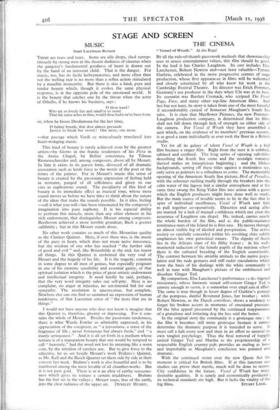STAGE AND SCREEN
MUSIC
Sunt Lacrimae Rerum
THERE are tears and tears. Some are idle drops, shed surrep- titiously by strong men in the decent darkness of cinemas when the gangster's fundamental goodness of heart is drawn out by the hand of an innocent child. That is the danger. For music, too, has its facile lachrymatories, and more often than not the welling tear is no more than a reflex action stimulated by a maudlin insincerity. But there is also a kind, pure and tender beauty which, though it evokes the same physical response, is at the opposite pole of the emotional world. It is the beauty that catches one by the throat when the actor
of Othello, if he knows his business, says : 0 thou weed !
Who art so lovely fair and smell'st so sweet That the sense aches at thee, would thou hadst ne'er been born.
or, when he kisses Desdemona for the last time, 0 balmy breath, that dost almost persuade
Justice to break her sword ! One more, one more.
—that passage which Verdi so miraculously translated into heart-wringing music.
This kind of beauty is rarely achieved even by the greatest artists—by Giotto in the frantic tenderness of his Pieta in the Arena Chapel, by Bellini sometimes, by Tilman Riemenschneider and, among composers, above all by Mozart. In him it exists in its purest form, divorced of all dramatic association such as lends force to the words of the poet or the forms of the painter. For in Mozart's music this sense of beauty is created by the passionate expression of feeling held in restraint, purged of all selfishness and given to our cars as euphonious sound. The peculiarity of this kind of beauty is its immediate effect as musical tone, whose mere sound moves us before we have time to think about the nature of the ideas that make the sounds possible. In it idea, feeling —call it what you will—has been transmuted by the composer's imagination into pure euphony. It is his especial ability to perform this miracle, more than any other element in his rich endowment, that distinguishes Mozart among composers. Beethoven achieved a more terrible grandeur, Bach a greater sublimity ; but in this Mozart stands alone.
No other work- contains so much of this Mozartian quality as the Clarinet Quintet. Here, if ever there was, is the music of the pure in heart, which does not mean naive innocence, but the wisdom of one who has reached " the further side of good and evil " and, like Brimnhilde at the end, has learnt all things. In this Quintet is enshrined the very soul of Mozart and the tragedy of his life. It is the tragedy, common in some degree to all men of genius, but especially poignant in one of his extreme sensibility and essential gaiety, of that spiritual isolation which is the price of great artistic endowment and intellectual integrity. It need hardly be said, perhaps, that the very word integrity rules out self-pity. Here is no complaint, no anger at injustice, no sentimental bid for our sympathy. The revelation is unconscious, but complete. Nowhere else can one find so sustained an expression of human tenderness, of that Lucretian sense of " the tears that are in things."
I would not have anyone who does not know it imagine that this Quintet is, therefore, gloomy or depressing. For it con- tains the whole of Mozart. Besides the passionate tenderness, there is what Warde Fowler so admirably expressed, in his appreciation of the composer, as " a joyousness, a sense of the fragrance of life ; never boisterous but always fresh," and " a manly seriousness." And it is all set forth in a medium whose texture is of a transparent beauty that one would be tempted to call " heavenly," had the word not lost its meaning, like a worn coin, by the attrition of careless use. But to give force to the adjective, let us set beside Mozart's work Brahms's Quintet, as Mr. Kell and the Busch Quartet set them side by side at their concert last week. Brahms's work is also beautiful and is to be numbered among the most lovable of all chamber-works. But it is not pure gold. There is in it an alloy of earthy sensuous- ness which gives its texture a certain muddiness. Brahms










































 Previous page
Previous page